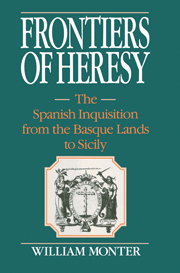Book contents
- Frontmatter
- Contents
- List of maps and figure
- List of tables
- Preface
- PART 1 THE HOLY OFFICE OUTSIDE CASTILE
- I The Castilian Inquisition in the Crown of Aragon, 1484–1530
- 2 The Aragonese century of the Spanish Inquisition, 1530–1630
- 3 The Aragonese Secretariat: public and private faces
- PART 2 ARAGONESE TRIBUNALS
- PART 3 ARAGONESE HERESIES
- PART 4 “MIXED CRIMES” IN ARAGON
- PART 5 RECESSIONAL
- APPENDICES
- Glossary
- Index
- CAMBRIDGE STUDIES IN EARLY MODERN HISTORY
I - The Castilian Inquisition in the Crown of Aragon, 1484–1530
Published online by Cambridge University Press: 24 October 2009
- Frontmatter
- Contents
- List of maps and figure
- List of tables
- Preface
- PART 1 THE HOLY OFFICE OUTSIDE CASTILE
- I The Castilian Inquisition in the Crown of Aragon, 1484–1530
- 2 The Aragonese century of the Spanish Inquisition, 1530–1630
- 3 The Aragonese Secretariat: public and private faces
- PART 2 ARAGONESE TRIBUNALS
- PART 3 ARAGONESE HERESIES
- PART 4 “MIXED CRIMES” IN ARAGON
- PART 5 RECESSIONAL
- APPENDICES
- Glossary
- Index
- CAMBRIDGE STUDIES IN EARLY MODERN HISTORY
Summary
Venian a fer la Inquisición con el deshorden que lo han fecho en Castilla, y aquellas mismas reglas y estremos trayan inquisimas y contra toda disposicion de derecho.
City of Teruel to Saragossa, 1484 (Floriano, in BRAH, 87(1925), p. 241).Así permitió Nuestro Señor que cuando se pensaba extirpar este santo oficio para que se resistiese y impidese tan santo negocio, se introdujese con la autoridad y vigor que se requeria.
(Zurita, Anales de Aragon, VIII, p. 507).Grandissimo e antichissimo odio è poi fra castigliani e aragonesi, e lo vanno benissimo conservando; e se non fosse … il gran timore di quest'offizio dell'Inquisizione, fra loro seguirano disordini di grande importanzia.
Venetian relazione, 1563 (Firpo, Relazioni, VIII, p. 410).The Spanish Inquisition, like such other important innovations of Ferdinand and Isabella as the Santa Hermandad or the corregidores, was born in Castile. The chroniclers of the Catholic monarchs, whether Old Christians like Bernaldez, conversos like Pulgar, or Aragonese like Zurita, all agreed on this point. Indeed, a careful search uncovers signs that Castilian prelates and noblemen had proposed a concordia with Isabella's predecessor Henry IV,” the Liberal,” enabling the king to sponsor the pursuit of converso heretics, and to confiscate their property, as early as 1464–65. Early in Isabella's reign, before any bulls had been sought in Rome to create an Inquisition under royal control, the episcopal vicar at Llerena burned two Judaizers alive for heresy, penanced two women and ordered their house destroyed.
- Type
- Chapter
- Information
- Frontiers of HeresyThe Spanish Inquisition from the Basque Lands to Sicily, pp. 3 - 28Publisher: Cambridge University PressPrint publication year: 1990
- 1
- Cited by



